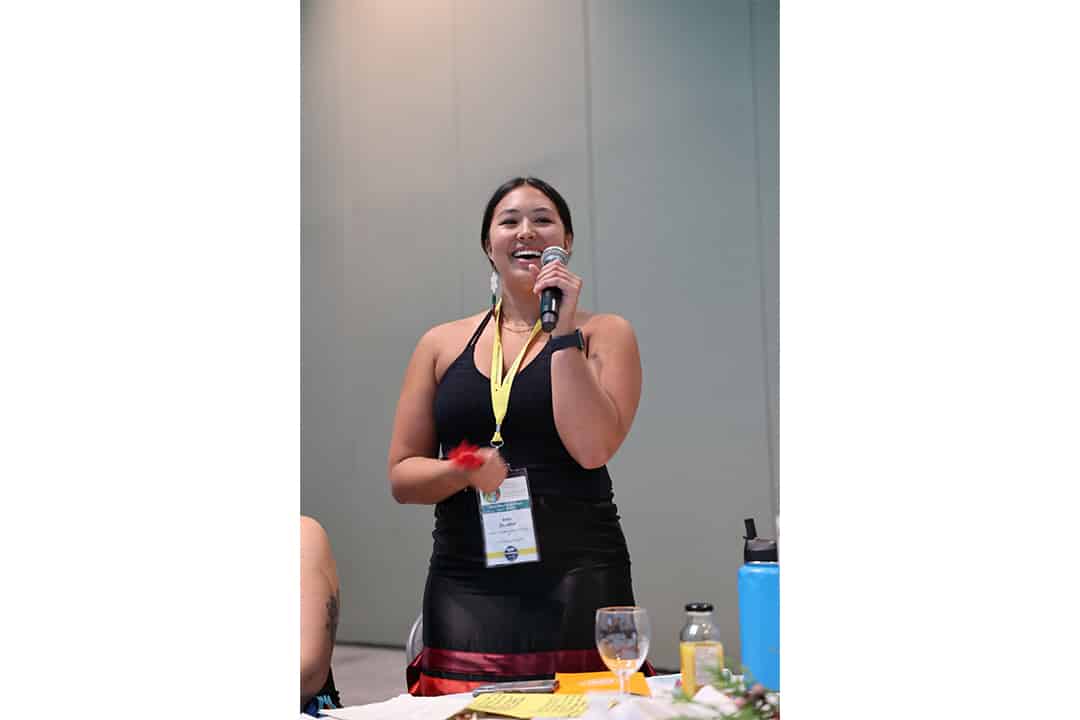Do you ever feel like you have to pick a version of yourself for the day but then become a completely different version of yourself as soon as you step into a different space?
That is a daily dilemma when I walk around the campus and this city. One second, I am a student going to my classes — not doing the readings and being an outgoing individual who seems like nothing would phase her. The next second, I’m stepping onto the pool deck as part of a team of 22, where usually my voice is not the loudest in the room. Then I’m racing to a round dance where I can meet up with my family and friends and just enjoy the drumming, singing, and food.
Most days I like it like this. Yet, truthfully, I’m still trying to figure out how to skillfully balance the various intersections of my life. So, let me introduce myself:
My name is Averi Doxtator. I’m a member of the Oneida of the Thames First Nation. My family is from Bkejwanong in Southern Ontario on my mom’s side and Sioux Valley, Manitoba on my dad’s side. I grew up in unceded Algonquin Territory in Ottawa playing every sport you could imagine. Hockey, gymnastics, volleyball, water polo — you name it, I’ve probably competed in it.
In 2022, I moved to Toronto to attend U of T and now play on the Varsity Blues women’s water polo team — I started in 2020, but we only started getting back in the water to play water polo after the pandemic restrictions were lifted.
Growing up in Ottawa was such a different experience for me because I realized that I did not get to experience my culture and teachings the way some of my relatives did. Of course, I’m grateful for the opportunities I had growing up in the city, mostly because it brought me closer to sports — making it such an important role in my life. Yet, as I got older, I realized that the relationship I had built with sports was filling in for the absence of culture at the time. Since much of my identity growing up was in sports, I believed I was my sport — that’s what I was known for.
It was when I started at U of T in 2020 that I realized water polo was becoming my entire identity. I thought my sport defined me because it was something I did so often. Then, it dawned that I did not want to remain limited to this box I created for myself.
I quickly realized that I have a responsibility to my Indigenous community to establish a reciprocal relationship. So, in the same year, I started to get involved with the urban Indigenous community in Toronto through the Native Canadian Centre of Toronto. That summer, I was elected President of the Indigenous Youth Council of the National Association of Friendship Centres. The role required me to be the voice for urban Indigenous youth nationwide to advocate for our resilience and to connect to our culture.
This position changed my mind about how I continued to present myself in my sport, school, and life in general. I let go of the idea that one thing — water polo — could define me, but I also let go of the pressure of giving back to my community because I learned how to show up for them in every space I walked into. My ‘community’ is no longer defined by the physical spaces I found myself in because I learned how to bring all versions of myself together.
I’m not a master at this yet. I sometimes struggle to relate to the experience of being a Varsity Blues athlete and not having anyone looking to make sure I am succeeding in the generic terms of success. Through my journey of reconnecting to my culture and language, I’ve learnt that these measures are a colonial perspective of what it means to succeed. Instead, success should be defined as wins you experience daily that fulfill your spirit.
So in that way, I already feel successful by learning how to be present for myself and the community that I have built around me. At the end of the day, I believe the people who are around you in the darkest of times will be the ones you are shining with when it’s the best of times.
Miigwech for the opportunity to share a bit of my story. If it doesn’t make sense to you right now, it will make sense in the future when you start letting go of a singular identity to define yourself.



No comments to display.